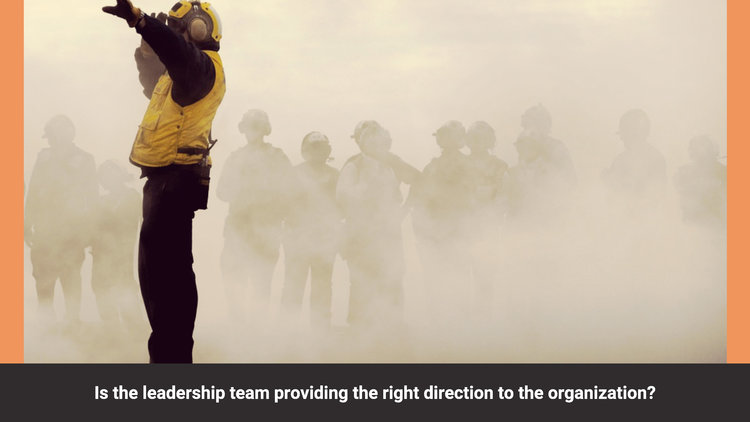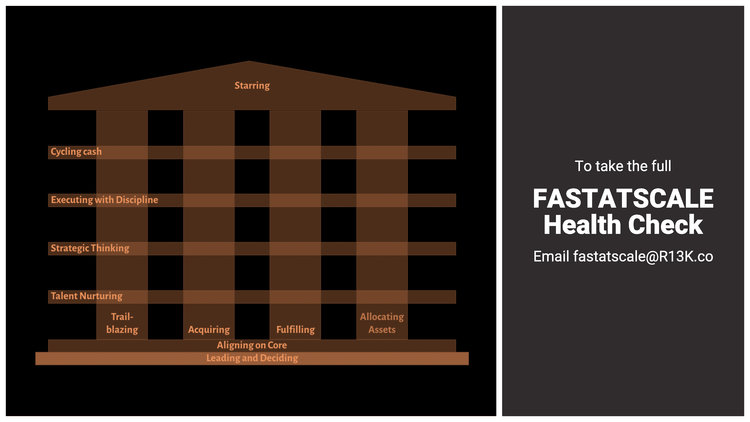7 Levers to Boost Leading & Deciding Momentum
Is your executive team providing a great example for the organization and giving them the right guidance to produce the results you want?

In the intricate dance of organizational success, the leadership team plays a pivotal role in steering the ship and making impactful decisions. The example set by the executive team reverberates throughout the organization, influencing its culture and performance. In this article, we delve into the seven levers that are integral to boosting leading and deciding momentum within the leadership echelons, forming the essence of our comprehensive FastAtScale™ model.
Here are seven levers I look at with executive teams.
-
Can leaders trust each other? Do they have each other’s back?
 Trust is the bedrock of effective leadership. Can leaders trust each other, and
do they have each other’s back? Cultivating a culture of mutual support and
trust within the executive team sets the stage for collaborative decision-making
and resilient leadership.
Trust is the bedrock of effective leadership. Can leaders trust each other, and
do they have each other’s back? Cultivating a culture of mutual support and
trust within the executive team sets the stage for collaborative decision-making
and resilient leadership. -
Do they engage in unfiltered conflict? In that they say what they really mean rather than what others want to hear?
 Open and honest communication is a hallmark of successful leadership. Does the
leadership team engage in unfiltered conflict, where opinions are expressed
transparently? Encouraging candid discussions fosters a culture of robust idea
exchange and promotes the exploration of diverse perspectives.
Open and honest communication is a hallmark of successful leadership. Does the
leadership team engage in unfiltered conflict, where opinions are expressed
transparently? Encouraging candid discussions fosters a culture of robust idea
exchange and promotes the exploration of diverse perspectives. -
Can they commit regardless to the plans they draw up together?
 Effective decision-making is only valuable if there’s commitment to the
agreed-upon plans. Can the executive team commit to the plans they draw up
together? A united front and shared commitment ensure that decisions are
executed with purpose and dedication.
Effective decision-making is only valuable if there’s commitment to the
agreed-upon plans. Can the executive team commit to the plans they draw up
together? A united front and shared commitment ensure that decisions are
executed with purpose and dedication. -
Are they holding each other accountable?
 Accountability within the leadership team is non-negotiable. Are they holding
each other accountable for their actions and decisions? Peer accountability
fosters a culture of responsibility, ensuring that leaders remain aligned with
organizational goals.
Accountability within the leadership team is non-negotiable. Are they holding
each other accountable for their actions and decisions? Peer accountability
fosters a culture of responsibility, ensuring that leaders remain aligned with
organizational goals. -
Do they care more about results than about titles.
 True leadership is about prioritizing results over titles. Does the leadership
team care more about results than about personal titles? Focusing on outcomes
promotes a culture of achievement and fosters an environment where merit speaks
louder than hierarchy.
True leadership is about prioritizing results over titles. Does the leadership
team care more about results than about personal titles? Focusing on outcomes
promotes a culture of achievement and fosters an environment where merit speaks
louder than hierarchy. -
Is the top leader showing humility, especially when things go wrong?
 Leadership is not immune to mistakes. Is the top leader showing humility,
especially in challenging times? Demonstrating humility in leadership fosters
trust and creates an environment where learning from setbacks becomes a
collective endeavor.
Leadership is not immune to mistakes. Is the top leader showing humility,
especially in challenging times? Demonstrating humility in leadership fosters
trust and creates an environment where learning from setbacks becomes a
collective endeavor. -
Are they nevertheless resolved to bring out the best in everyone?
 Leadership is not just about making decisions; it’s about inspiring greatness in
others. Are the leaders resolved to bring out the best in everyone? This
commitment ensures that the entire organization benefits from the collective
expertise and potential within the team.
Leadership is not just about making decisions; it’s about inspiring greatness in
others. Are the leaders resolved to bring out the best in everyone? This
commitment ensures that the entire organization benefits from the collective
expertise and potential within the team.
In conclusion, leading and deciding momentum within the leadership team is crucial for organizational success. By addressing these seven levers comprehensively, the executive team sets the stage for a culture of effective decision-making, accountability, and continuous improvement.
Leadership and Decision Making is just one of the 11 levers in our full FastAtScale™ model.
Take the test yourself by sending an email to fastatscale@midstage.org
